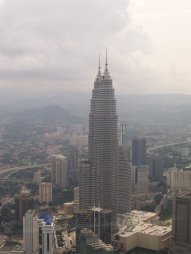After the stalemate of the Korean War South Korea was a developing nation. It was on a par with the British Gold Coast (Ghana) and Malaya (which became Malaysia and Singapore).
However, something truly remarkable happened in South Korea. It has been called the Miracle on the Han River (the Han River runs through Seoul, South Korea's captial city) and has been used as a template for economic growth and development for a developing nation.
Seoul was a typical developing city. High unemployment and high poverty. However the US Government, determined to keep the South out of the hand of the Communist North, followed the template of the rebuilding of both Germany and Japan.
Rapid industrialisation began in the late 1950s and the aim was to become a massive exporter to the Western markets of goods such as electronics, ship building, textiles, cars, and steel.
Influenced by Reaganomics, the South Koreans also kept inflation low by reducing the money supply, but also embarked on many public works to rebuild infrastructure such as transport links and communication links.
A major announcement to the World that South Korea was a major player in the global economy was the succesfull 1988 Summer Olympics held in Seoul.
South Korea is often cited as an imitator of Japan, but with the US influence and the gradual move away from a Government controlled market to one that reflects consumer needs, the comparison is actually a natural one.
The benefits to the average South Korean has resulted in an incredible rise in the standard of living, and superior education to what was available in comparitor nations of the 1950s.
The Tiger Economies of Asia have attempted to copy South Korea and many have grown their own economies but none have had the impact on the ordinary people as the South Koreans have.
Malaysia has the aim of being developed by 2020, and the influence of South Korea is apparent. A move away from agriculture to manufacturing, and the building of public projects such as the KL monorail and the KLIA (Kuala Lumpur International Airport) in addition to hosting an Formula 1 race and the 1998 Commonwealth Games.
But as we have seen with India, the problem is that if a nation moves too quickly to the services sector they run the risk of having nothing unique. The same could be said of manufacturing, but as we all are aware, South Korea, Japan, and Taiwan have built their economies on cheap but good quality goods, relying on cheap labour, but also excellent quality control and standardisation where possible.
Singapore and Hong Kong are different in that they have built their prosperity on being financial hubs. But again they are relatively small city-states (well Hong Kong does have a unique status in China!) compared to the behemoths of India and China.
I think the Miracle of the Han River may be replicated in other nations but they do rely on the backing of a major importer like the United States and they need to create global brands that will attract consumers.
But there is no doubt that the 21st Century will belong to Asia and the Pacific.



